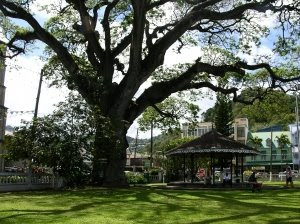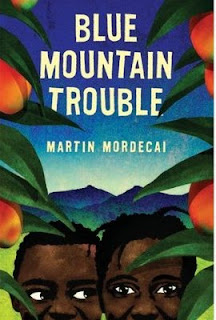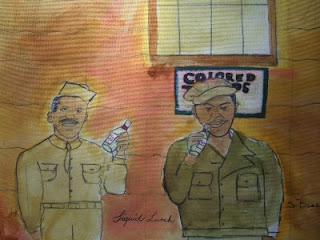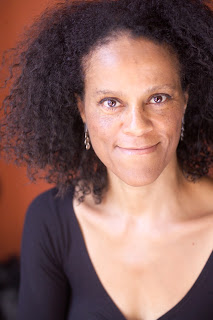
A writer learns her craft by toil, failure, and providence. But mostly from failure. For writing is a solitary discipline--learning to create a poem, short story or poem from a fleeting phrase, an ephemeral image or an indelible experience. And she must do this by using language that is true to her life and her community while she is also learning from other writers, living or dead, how to balance tone and rhythm, metaphor and rhyme, plot and pacing while maintaining her unique vision. This, as
Pam Mordecai recently stated, takes persistence and courage.
For it is so easy to give in and fade into the crowd. Better to be a prodigal and to be welcomed back into the bleating herd of writers.
But if she is lucky, she may find a way to speak with confidence in the timbre of her own voice. If she is very lucky, she may find a living mentor who may offer her guidance at a crucial stage of her career. A living mentor, as John O' Donohue has suggested in
Divine Beauty, has a valuable place in any society: "To know they are there, day in day out, at the frontiers of their own limitation and vision, probing further into new possibility, enduring at lonely thresholds in the hope of discovery, to know they are willing to risk everything is both disturbing and comforting" (257).
I count myself among the lucky because throughout by development as a writer, I've had several mentors who have guided me for the past thirty years.
My first mentor was Dennis Scott and it was through his work that I discovered Anthony McNeill, Mervyn Morris, Derek Walcott, and Kamau Brathwaite. Dennis helped me to see many of my strengths as a writer, but when I came to America and after his subsequent death, I was pretty much on my own.
Of course, I continued to take classes to learn as much as I could from writers such as Isaac Bashevis Singer, O. R. Dathorne, Lester Goran, and Evelyn Wilde Mayerson, who offered me encouragement, but I was essentially rudderless.
I didn't want to become an exiled writer like many of the luminaries of Caribbean literature who over the years grew further and further away from the communities that gave birth to their talent. I had grown up with the music of the "Reggae Generation" and Bob Marley, in particular: "Children, get your culture/ And don't stay there an jester" ("Natty Dread').
Yet it wasn't until I attended the Caribbean Writers' Summer Institute and met Kamau Brathwaite that things began to change. Sure it was a large class, but when Kamau spoke to us about creating beauty from the trees, flowers, plants, and animals that surrounded us, I began to see a way out. It was also a thrill to be in the same room, in the very presence--breathing the same air--of a poet whose work I had long admired.
In our poetry seminar, Kamau suggested a new way of looking at Florida as a part of the Caribbean both in terms of the geography and sensibility-- a unity that was "submarine." Through his words, I was able to find a connection between Jamaica and Florida--my two homes.
Over the days that the seminar continued, we recoiled in horror when Kamau told of about the destruction of his library in Jamaica. To date, I don't know if any of these treasures have been recovered, but they no doubt are part of literary landscape of the Caribbean that has been lost.
So much in the Caribbean comes and goes, it is hard to preserve anything under these circumstances. And the mercantilist mindset that we have toward "soft" things such as literature doesn't help either.
From this insight came hurricane center and xango music. Both locales faced the yearly threat of physical and psychic hurricanes that threaten to destroy anything that we try to build. And there was always the music even in the face of destruction of lives and dreams.
And because we lack sustainable artistic communities, the importance of living mentors within the Caribbean cannot be overstated. For as O' Donohue states in Divine Beauty: "The presence of the contemplative and the artist in a culture is ultimately an invitation to awaken and engage one's neglected gifts, to enter more fully into the dream of the eternal that has brought us here to earth" (257).
Kamau taught us that despite all this, we must build--we must preserve. His example served as the impetus for the creation of this blog. From the start, Kamau was one of the first to urge me to continue and as I have followed his example with x-periments, in my prose and poetry, this blog has also been an attempt to preserve and showcase the literary talents from my two homes.
In the Sufi tradition there is a concept known as the "blessed glance" between a master and an adept. I don't know if I received this from any of my mentors, but I do know that through their words they have given me the confidence to pursue my path.
Give thanks, Kamau, for all that you have done and continue to do for InI.
1Love,
Geoffrey
***
In the course of writing this post, I received a disturbing e-mail from Kamau for me to spread the news about strange occurrences in his office and at his home. I hope that these incidents have stopped.
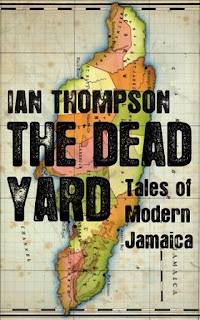 Jamaica used to the source of much of Britain’s wealth, an island where slaves grew sugar and the money flowed out in vast quantities. It was a tropical paradise for the planters, a Babylonian exile for the Africans shipped to the Caribbean.
Jamaica used to the source of much of Britain’s wealth, an island where slaves grew sugar and the money flowed out in vast quantities. It was a tropical paradise for the planters, a Babylonian exile for the Africans shipped to the Caribbean.